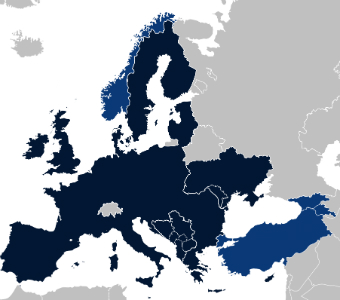Southeastern Europe deserves a better energy future – and now is the time to ensure it happens
Brussels, Prague, Sarajevo – The revision process of the Energy Community Treaty is entering its final lap these days, offering a real opportunity to transform member countries’ energy landscape. More than one year since the start of the Treaty revision, the second round of public consultations is closing today.
6 March 2015

Brussels, Prague, Sarajevo – The revision process of the Energy Community Treaty [1] is entering its final lap these days, offering a real opportunity to transform member countries’ energy landscape. More than one year since the start of the Treaty revision, the second round of public consultations is closing today.
A number of proposals from the European Commission fall short of the original goals of the treaty – primarily, to bring energy, environmental and climate standards in southeastern Europe in line with the EU’s – but civil society groups, in comments submitted today, argue that the new Energy Community can and should seize the opportunity to achieve this.
In June 2014 the High Level Reflection Group (HLRG) [2] released a recommendations report that was overall environmentally progressive.
The European Commission tabled its own set of proposals for reform (pdf) based on input from the Member States. Yet, unfortunately, some aspects of this version, if adopted, could allow the countries of the Energy Community to fall behind on EU energy, environmental and climate standards.
“For example, the Commission’s text suggesting it would be too difficult for Energy Community countries to transpose the EU’s Air Quality Directive is essentially going against everything that EU climate and energy policies stand for,” says Ioana Ciuta, Energy Co-ordinator at CEE Bankwatch Network.
Heavy reliance on coal burning for electricity in southeastern Europe has also meant a heavy toll on public health. A recent study by the Tuzla-based Center for Ecology and Energy estimated that in 2013, coal power plants in Bosnia and Herzegovina’s Tuzla region, for instance, caused the loss of approximately 4900 years of life, 131,000 lost working days due to heart and respiratory illnesses and around EUR 61 million in economic cost.
But this is not a given. In their input submitted today to the public consultation, a group of 18 leading NGOs [3] active in the Balkans region is insisting that the treaty’s review is an opportunity to bring to southeastern Europe the energy and climate policies these countries deserve to make substantial and sustainable development.
“It’s not just about promoting any energy investment, but rather about advancing carefully chosen energy sources,” says Garret Tankosić-Kelly, SEE Change Net Principal. “If the Energy Community doesn’t have increased monitoring and enforcement capacity, energy investments currently planned could end up infringing EU acquis or become stranded assets in the medium-long term.”
Therefore, a serious reform of the Energy Community’s institutions is needed, and particularly the Secretariat which is currently lacking sufficient staffing in the environment and social fields.
“The Energy Community needs to develop beyond merely serving the business sector,” concludes Dragana Mileusnic, Energy Policy Coordinator for South East Europe at Climate Action Network Europe. “It has to start making a difference for communities severely affected by obsolete and polluting power plants and a weak rule of law.”
Notes for editors:
Read more about the European Community:
https://bankwatch.org/campaign/coal/energy-community
1. The Energy Community brings together Albania, Bosnia and Herzegovina, Kosovo, Macedonia, Moldova, Montenegro, Serbia and Ukraine – and soon also Georgia – with the goal of creating a common energy market between the EU and some of its neighbours. It also aims to extend the EU internal energy policy to south east Europe and the Black Sea region. This includes the obligation for member countries to implement EU environmental law and renewable energy targets.
2. The expert group which was commissioned by the Energy Community to review the institution’s set-up and working methods and to propose directions of reform.
3. CEE Bankwatch Network; Climate Action Network Europe; Health and Environment Alliance; SEE Change Net; EDEN – Environmental Center for Development, Education and Networking (Albania); Ekolevizja (Albania); CPI – Public Interest Advocacy Center (Bosnia and Herzegovina); CZZS – Center for Environment (Bosnia and Herzegovina); DOOR (Croatia); FSO – Forum for Freedom in Education (Croatia); ATRC – Advocacy Training and Resource Center (Kosovo); Front 21/42 (Macedonia); Analytica (Macedonia); Eko-Svest (Macedonia); Green Home (Montenegro); MANS (Montenegro); CEKOR (Serbia); Fractal (Serbia)
For more information contact:
Ioana Ciuta
Energy Coordinator, CEE Bankwatch Network
ioana.ciuta@bankwatch.org
Tel.: +40 724 020 281
Dragana Mileusnic
Energy Policy Coordinator for South East Europe, Climate Action Network Europe
dragana@caneurope.org
Tel.: +32 471 438 442
Masha Durkalić
Communication Officer, SEE Change Net
masha@seechangenet.org
Tel.: +387 33 213 716
–
Image: Contracting parties and candidates to the Energy Community. (Original image by Wikimedia user Ssolbergj – available at http://commons.wikimedia.org/wiki/File:Energy_Community.svg)
Never miss an update
We expose the risks of international public finance and bring critical updates from the ground – straight to your inbox.
